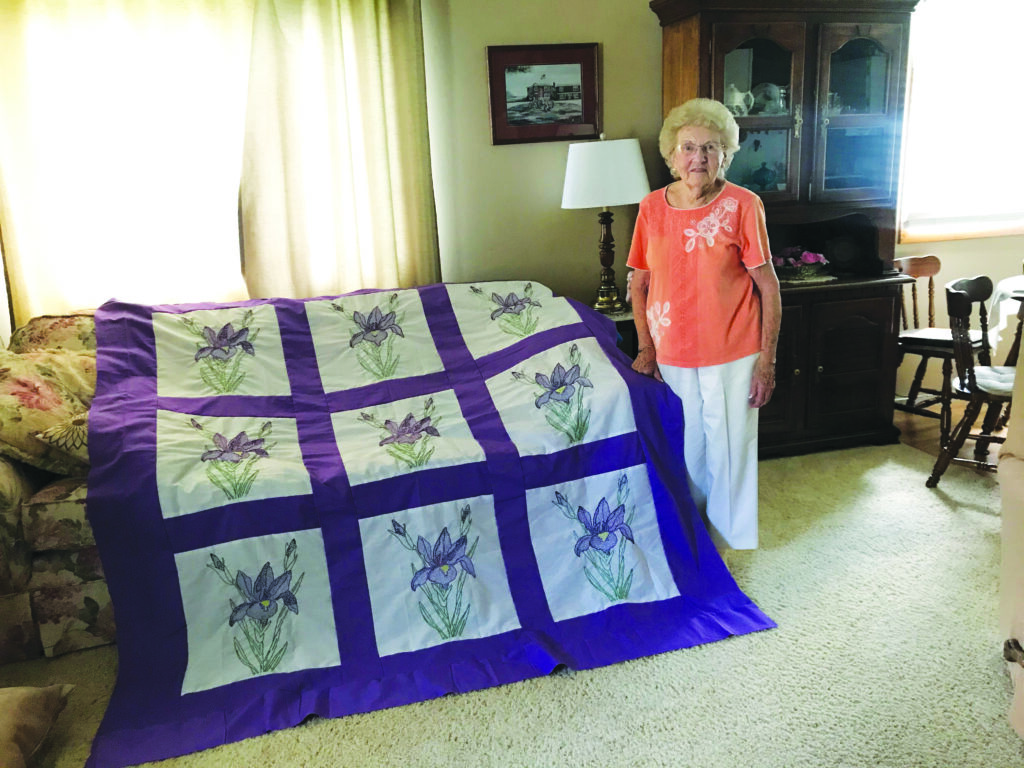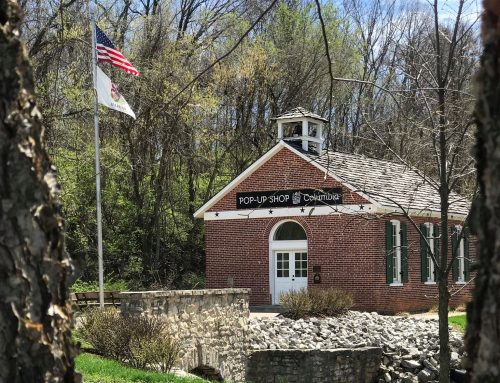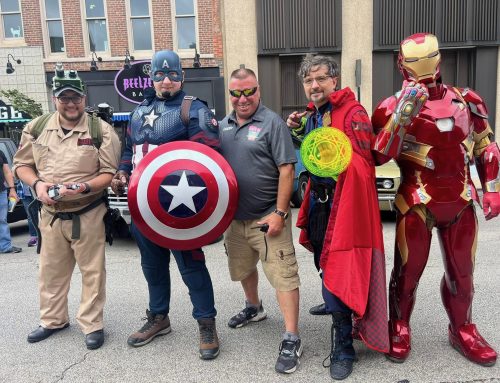
Leona Hacker, soon to be 100 years old, shows off a quilt she is embroidering by hand for one of her granddaughters. This woman is never idle. But it is one of her secrets for long life – keep moving!
By Tara L. Cale
Leona Hacker, a Girard resident, grew up on a farm outside of Harvel, Illinois. The last of six children (4 boys and 2 girls), she was born on September 28, 1920. Hacker will be celebrating her 100th birthday this month. Her start in life was not an indicator of the long, blessed life she has come to know. Leona was born prematurely, and with whooping cough. Babies with whooping cough sometimes had a symptom known as “apnea” – a pause in the child’s breathing pattern. Leona had this. If she was laid down, she would stop breathing.
“My maternal grandmother basically held me over her shoulder day and night, for months, to keep me alive,” Leona explained. Even at such a young age, the tenacity of her personality was evident.
Leona explained that her first true memory is from when she was around three years old.
“My father was one of the first to have the new Ford sedan that year,” she said.
“It had running boards on the side and when Father was coming home, my brothers would run out and jump on the running boards and ride on them, up the lane.”
One day, all of the children were outside and her next older sibling, brother Edward, who was then eight years old, ran out to jump on the running boards. But, another car was driving down the road, at a high rate of speed, and hit Edward. The impact was such that it threw the small boy into the family’s grape arbor.
“I was very young. I tried to run to him, but two of my older brothers held me back,” she said. “If I could draw, and I can’t, I could sketch out a picture of exactly what that scene looked like. Because it is embedded so profoundly in my memory, even to this day, that I remember every detail.”
Leona’s next memory is when she was around five years old. It’s in 1925. There was no Kindergarten. Children did not start school until the first grade when they were six years old. But the teacher at their one-room country school where her brothers and sister attended would often mention to Leona’s mother that she should send her to school with her older siblings. He wanted another student in first grade as he only had one. (For those of you unfamiliar, in-country schools it was a one-room schoolhouse and all grades were taught in the same room.)
“Mother finally agreed to let me go, assuming I would grow tired of it in a few days and not want to go back, but she was wrong,” Leona said. “I stayed. I loved it. I loved reading, writing, and spelling – and education would ultimately become my profession.”
Leona was very smart. Teachers and other educators recognized this. They took her to the country spelling bees every spring, and even though Leona was competing against students in much higher grades, she always brought the banner back to school. And at her eighth-grade graduation, she was presented with a four-year scholarship to teacher’s college.
She graduated from high school when she was just 15 years old. Leona’s parents were against her enrolling in college. Her father did not feel it was fair that she should get to go to college when her brothers had not.
Leona craved a higher education. She had the brains, but she needed a little more brawn.
Many people in the community were aware of the situation and thought it would be a crime if this bright, young woman was not given the opportunity to use her scholarship, her intelligence and the tenacity she was born with, to further her education, her career, and her life.
The principal, his wife, another teacher, and a few others in the community began helping Leona plan, and execute her mission for her future.
The principal enrolled her in college without her parents’ knowledge. The tuition was paid for by the scholarship. Two separate neighbors donated $7 each for the $14/year she would need for her books.
In preparation for leaving for college, Leona would go out on a “date” with a cooperating teacher. She would wear two sets of clothing on this date, one over top of the other. When they were far enough from Leona’s home, she would remove one layer of clothing, and take to the principal’s home for safekeeping.
Time was of the essence, and with only a few days remaining until Leona had to be at college, she made her escape.
“I crawled through a ditch, and didn’t get up until I got to the edge of the cornfield, so there was no chance of my brothers seeing me leaving,” she explained. “One of the neighbors drove me into Harvel where I caught a bus to Normal, IL.”
Her principal had contacts in the area and helped her secure a room for $2/week – just four blocks from school – so she could walk to classes. He also knew other families with students at Eureka College who donated more clothing for Leona, as she had only had time to stow away three days worth of daily wear.
She was now in Normal, ready to begin her higher education. She got a job at a local cafeteria and worked two different shifts, one-and-a-half hours each, in
exchange for two meals a day. The owners, fondly referred to as Mama and Papa Sims, also let her work extra hours on Saturdays and Sundays to make money for her incidentals.
“Earlier, in discussions that my parents had with the high school teacher and counselor, I had listened through the door and heard them say that I had a high IQ,” Leona laughed. “I found out that didn’t mean much when it came to college, and you still had to study to make it.”
Leona didn’t do well on the finals at the end of her first year. But the Dean was lenient because although Leona did not know this, her mother had been writing to her. After discovering what her daughter had done, and where she had gone, she was checking up on her “baby” and keeping tabs on her to make sure she was okay. Understanding the circumstances that had brought Leona to the campus, the Dean was compassionate.
“Then one day when I went to work, I saw one of my older brothers outside of the cafe, pacing back and forth,” she said. “He had found out where I worked and had made an arrangement with Mama and Papa Sims to give me a Sunday off so I could go home to visit. He arranged for a taxi to take me to his truck, outside of Normal, and I rode home with him.”
“I was just 16 years old, riding for the first time in a taxi in a big city and I was terrified,” she said. “And the taxi kept stalling out, but I finally made it.”
It worked out well, in the end. Leona apologized to her mother for going behind her back and filling her with worry and the two made up.
Leona went back to Normal to complete her degree, but a freak accident delayed that progress.
“My roommate, Regina Fennell, loved to embroidery,” Leona said. “I came back to our room after class one day and threw myself down on the bed. Her scissors were laying there and punctured my leg.”
The injury was attended to by the House Mother, but when Leona got to work later that day, Papa Sims thought it needed more doctoring. He added a thick layer of iodine. Unfortunately, and what was unknown at the time, Leona was allergic to iodine. The treatment made the wound worse and complications from the reaction forced Leona to take the next year off from classes.
“I fully intended to go back to classes but the injury just wouldn’t heal,” Leona explained.
“And, before you know it, I was in love, married and pregnant.”
When Leona’s first child, a daughter, was two years old, she got pregnant with her second child, a son. And then, World War II had begun. Leona’s husband had been in the Navy previously and was called back to serve again.
“They really needed teachers bad at this time and they said if I came back, I could complete my degree in just one year,” she said. “But I just couldn’t leave my kids in the care of someone else when they were so young.”
Her husband returned from the war and they had three more children. But he just wasn’t the same after the war. He didn’t want to do anything and would take no responsibility. Today, it may be recognized as PTSD, but then there wasn’t a term, a diagnosis, or a treatment. Leona didn’t want to talk much about this time in her life, because it was not so good. Leona took in ironing jobs, cleaned businesses, and did what she could to support the family.
“After my last son was born, several people encouraged me to go back to school,” she said. “They were impressed with the behavior of my children and thought I had something to offer to others. And it was discovered that my scholarship could be reinstated!”
Leona Hacker started working towards her degree in 1937 and finished it in 1960. But the point is, she finished.
She was a teacher in Morrisonville for two years, then in Girard for 32 years. During that time she decided she wanted to get her Master’s Degree, and SIUE was offering that option. After obtaining her Master’s from SIUE, she went on to get yet another degree in Creative Writing from Sangamon State University.
Leona officially “retired” in 1986. Retired from teaching after 37 years. But she did not retire from life.
“After retiring from teaching I wanted to work in the travel industry, but that didn’t work out,” she laughed. “But I don’t let small setbacks hold me back.”
She worked as a substitute teacher for 15 years and worked as a volunteer usher at Sangamon Auditorium.
“That was amazing. I got to see so many shows for free,” she said. “My all-time favorite is CATS.”
Leona Hacker is not one to let time just slip on by. Since retiring she did ballroom dancing and line dancing. For years she walked several miles a week and even worked out at local gyms, but says she just doesn’t have time for that anymore. I asked her what helped her attain the age of 100 and in the amazing health that she is.
“Good genes help. My mother lived to 94 and my father was 99 before he passed,” she said. “Good doctors help too!”
She also said it is very important to practice faith, not fear in your life, specifically referring to the current pandemic.
“This is just another period of our lives,” she said.
She should know. She lived through the Great Depression(1929-1939), the Great Recession(2007-2008), the 1957 flu pandemic, the 1968 flu pandemic, the 2002-2003 SARS outbreak, the 2009 flu pandemic, the 2012 MERS outbreak, the 2014 Ebola epidemic, shall I go on? A polio vaccine wasn’t licensed until 1955, at which time Leona already had children. How scary was that? By the time a vaccine for measles(1963), mumps(1967), and rubella(1969) were developed, her children, and even some of her grandchildren probably had all already had these viruses.
Good and bad, rough waters and smooth sailing, Leona is grateful for the life she has lived, and its many blessings.
“Some of my former students are now grandparents and still live in Girard so I still enjoy visits with them,” she smiled. “But at my age, yes, people I know have passed on and that touches my heart with sadness.”
She is especially thankful to have her five children and their spouses, 16 grandchildren, over 30 great-grandchildren, and six great-great-grandchildren. She appreciates the fact that she can still live on her own and take care of herself, with a little help now and then from friends and family. She even still drives, though admits “not very far.”
Another thing I found quite impressive is that not only does Leona get up every day, but she gets up and gives it her all. This woman is always dressed to the nines, hair did, makeup on and all. What a gem!
Now, Leona Hacker may have had a rough start at life. She may have had some rough years. But life is what you make it, and Leona made it good.
Of course, I cannot do justice to 100 years of memories, accomplishments, mountains, and milestones in just a couple pages of writing, but after meeting this amazing woman, and getting to know her better, there is one thing I know for sure… if I live to be 100, I hope I am half the woman – half the person – that Leona Hacker is.
Leona is an inspiration to us all – to work hard, follow your dreams, and never give up!





Mrs. Hacker! Happy birthday! You were my 3rd and 5th grade teacher in Girard in 1966 and 1968. I’ve never forgotten you! I’m now in my 40th year teaching and I’ve taught 3rd and 5th grades several times!
Again, Happy 100th Birthday!!!
Bonnie Hazelwood
We love you Leona Hacker ❤️❤️❤️
Happy Birthday Mrs. Hacker, you were my first or second grade teacher. Not sure what kind of student I was but always thought you were kind & did not want to disappoint you. ( Mary Talley) You are an inspiration to us baby boomers, keep up the good work you enjoy!!
I love when Leona comes in to the local pharmacy where I work. She always has great stories to tell and I just sit back and let her tell them. She is an amazing woman. Still gets around very well and for the most part on her own. She brings back up (her son) on occasion but probably only because he insists.. yes this lady is an inspiration to all who know her. Very nice article
One of my very favorite Teachers, Thank You for being so nice to me ,you never made me fell less then the other kids
And that has always stayed with me. Kelly Drew
Dearest Leona what an inspiration to the accolades you’ve achieved through the years.
God knew that your life was to be spent wisely a n d most of all that you give him all glory honor and praise.
I only know you through seeing you periodically in Girard back in the day. Your a sweet heart and a real cutie.
The last time we saw you Keith Abner my nephew his mother Sharon Abner were sitting at a food stand in Nilwood a couple years back. Enjoying some food truck food!
You came to sit with us or possibly it may of been the other way around. But it was a joy to meet you personally.
You reminded me of my own mother Gertrude Stoddard. SHE came from a very poor family as well.
She was very bright beyond her years but unfortunately she didn’t have anyone to encourage her like your friends did you.
She did skip a grade or two and she definitely was larger than life. Could of been anything I believe in life. But chose to be a wife~ mother~ pastors wife~ and eventually dealt in antiques.
At 10 years of age she bought herself a little guitar which she sold seeds to obtain the guitar. Her first radio talent show was Radio Bill’s in Eldorado Illinois 80 years ago approx.
She actually won first place and her winnings was a whole whopping $5.00 dollars that she gave to her mother.
I pray you celebrate this 100 years realizing Gods grace has been with you definitely.
Blessings across the miles My name is Shelia Stoddard~ I live in Nebraska now and miss
my home state of Illinois.
Have a blessed day and may God be merciful always.
????????????
Happy Birthday Mrs. Hacker! You are quite an inspiration. ❤️
she is an amazing woman, and an inspiration!